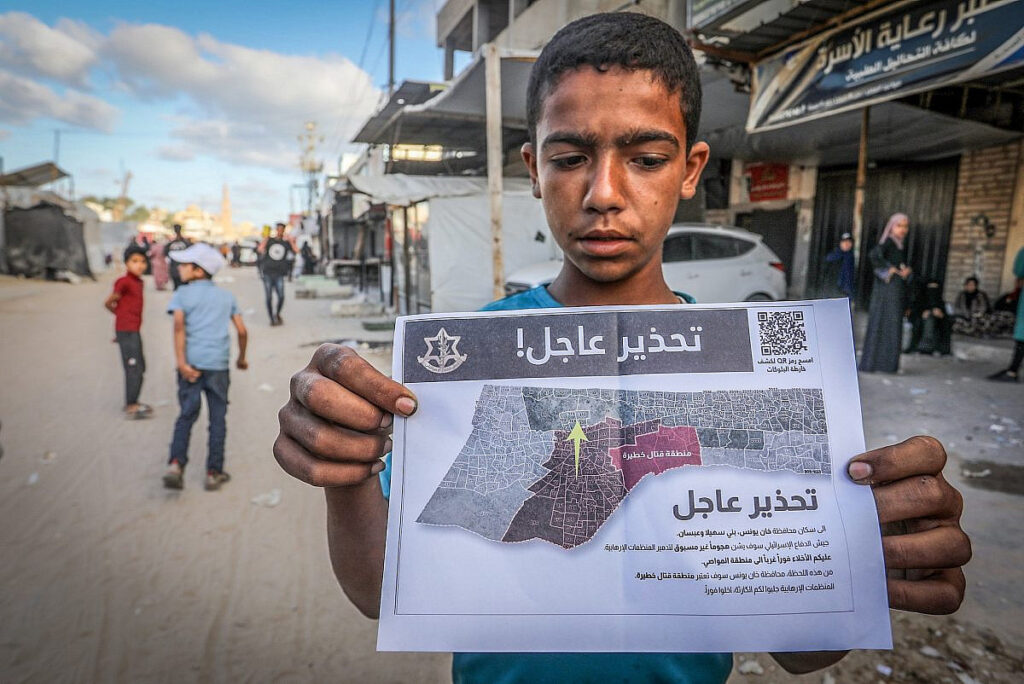The past six weeks have been marked by constant tank shelling, airstrikes, and ambulance sirens transporting wounded to the nearby European Hospital. Around 80 percent of the people in our area have already fled to Al-Mawasi, the so-called “safe zone” where, just days ago, Israeli forces killed 25 displaced Palestinians sheltering in homes and tents.

Until this morning, my family had hoped to stay in Al-Fukhari and try to maintain some semblance of normal life. But after an airstrike hit a school near our home, we decided to leave for my aunt’s house in the Khan Younis refugee camp, west of the city.
My brother Muhammad continues providing logistical support to Doctors Without Borders at Nasser Hospital west of Khan Younis. Alongside my journalism work, I spend several days each week teaching students who gather at a tent cluster in western Khan Younis that serves as a temporary school.
Before the war, I worked full-time as a science teacher and part-time as a journalist. Now journalism occupies most of my time, though I still try to teach as much as possible in these conditions. Through an educational program run by Rebuilding Alliance, a U.S.-based NGO, I work with children who have missed nearly two years of schooling, yet maintain their desire to study. Many come to class hungry and thirsty. Some have lost their parents, siblings or friends. Their mornings begin not with schoolwork, but with searching for food and clean water.
Several students have told me directly how the conditions affect their learning. “I don’t understand the science material because I’m hungry,” one said to me recently. Another explained, “I’m tired. I came here to rest, to breathe.”

Teaching hungry, exhausted children while they sit on burning sand in sweltering tents without desks, chairs, or proper facilities, mocks the very idea of education. Yet I continue, because their desire to learn is a form of resistance — and so is my teaching.
The hospital becomes a target
Last Tuesday, May 13, began as normally as any day can in this impossible reality. I extended my teaching hours to free up time for my mother’s urgent spinal surgery scheduled the next morning. My siblings and I planned to accompany her to the European Hospital before dawn to prepare for the procedure.
Shortly after 6 p.m, as my sister Enas and I sat facing each other on our beds, deafening explosions suddenly shook our neighborhood. I rushed to her bed and hugged her tight, as we screamed uncontrollably. Our mother cried for help from her room and we ran to her, while desperately calling for our father and brother Muhammad, though he was far away at work. The bombing continued for long, terrifying minutes. We were certain the house would collapse on top of us.

These explosions, we later learned, were bunker-buster bombs, four striking near Al-Fukhari. When the bombing ceased, we emerged from the house to find chaos: terrified neighbors running through smoke-filled streets, choking on toxic air. “The bombing is in the European Hospital,” someone shouted — just 300 meters from our home.
The panic intensified after we learned Israel’s claim that the target of the attack was Hamas leader Muhammad Sinwar, and that the operation was ongoing. The bombs had devastated the hospital courtyard and adjacent residential entrance, killing 28. Around 20 more were buried under the Al-Afghani family’s collapsed home.
My brother, unable to reach us due to a communications blackout, rushed home convinced our neighborhood had been obliterated. That night, we sat at home in shell-shocked silence, but at least we were together.
The next morning, we went to the European Hospital, unsure if my mother’s surgery would proceed. I was not prepared for the devastation that awaited us: corridors overflowing with patients, medical staff navigating through debris, critical infrastructure in ruins. The damage from last night’s bombing was worse than we’d imagined.

When it became clear that the operation had been canceled, we remained in the hospital for another 90 minutes, unsure when it would be safe to head out. Fearing that things would escalate and that we would be trapped in the hospital, we decided to leave — only to find a large crowd at the gates: neighbors assessing the damage, my sister and uncle arriving to help with my mother’s now-cancelled procedure.
As we started making our way back home, we saw a bulldozer clearing rubble from yesterday’s attack. As we passed by it, I had a sudden uneasy feeling, and told my mother and brother to take a different route. Five minutes later, we heard two consecutive explosions from the direction of the hospital. We turned to see medical personnel sprinting from the site, saying that Israeli forces targeted the bulldozer we just walked by.
Since May 13, we’ve lived in a state of relentless fear and anxiety. Our neighborhood’s streets lie in ruins; even the local supermarket was hit. With Israel’s “Gideon’s Chariots” operation advancing nearby, we monitor developments closely, as we know that even outside of Al-Fukhari we are not safe. These are undoubtedly the war’s worst days yet — and we have no idea what horrors tomorrow may bring.
__________________________________________________
